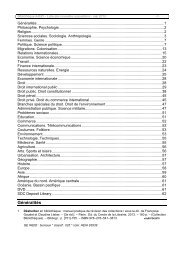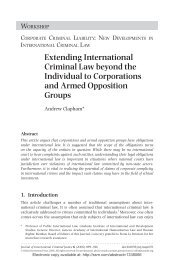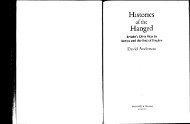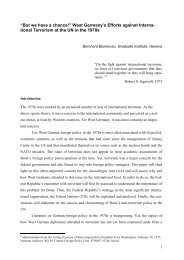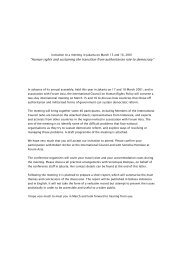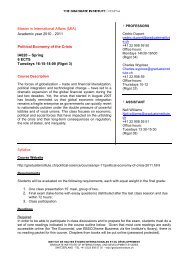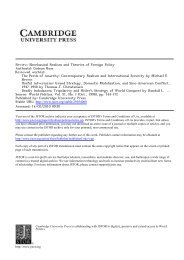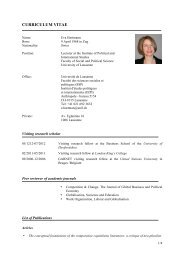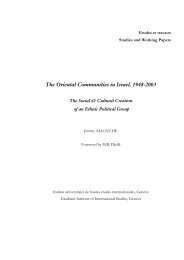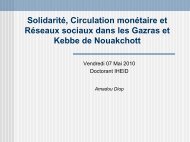Download - The Graduate Institute, Geneva
Download - The Graduate Institute, Geneva
Download - The Graduate Institute, Geneva
Create successful ePaper yourself
Turn your PDF publications into a flip-book with our unique Google optimized e-Paper software.
concerned, however undesirable or dangerous, cannot be taken into<br />
account...”. 16<br />
<strong>The</strong>refore, arguments of the “ticking time bomb” kind 17 or claims for balancing the<br />
risk of harm against the alleged dangerousness of the deported person for the<br />
security of the community 18 do not hold water.<br />
<strong>The</strong> absolute character of those rules, however, does not signify the<br />
elimination of discretion in their application. First of all, human rights – as all other<br />
norms – are cast in linguistic form; and linguistic forms can always give rise to<br />
indeterminacy. 19 Definitions, even clear-cut ones, require interpretation (i.e. whether<br />
a specific behaviour constitutes torture or not) and principles come with<br />
counterprinciples. But more importantly, human rights are not the articulation of an<br />
objective reason or truth – and this is so even for the so-called fundamental rights.<br />
<strong>The</strong>y are the product of a constant clash between different and usually opposing<br />
values. Finally, there is a tendency to re-conceptualize the various opposing values<br />
as a human rights issue. In the case of the principle of non-refoulement, for example,<br />
governments have appropriated human rights language in order to express their<br />
security concerns. 20 So, the argument about human rights’ absoluteness or objectivity<br />
reflects an unattainable aspiration rather than reality. 21<br />
This is very well illustrated in the case of the principle of non-refoulement.<br />
16<br />
Saadi v. Italy, ECtHR (Grand Chamber), Application No. 37201/06, judgment of 28 February 2008, §138,<br />
reaffirming the findings of the Court in the Chahal case; see Chahal v. UK, judgment of 15 November 1996,<br />
ECtHR, REPORTS OF DECISIONS AND JUDGMENTS (1996-V), pp. 1831 et seq. = 23 EHRR, pp. 413 et seq., §§79-81. <strong>The</strong><br />
CAT Committee has taken the same approach by stressing that “the test of article 3 of the Convention is<br />
absolute...<strong>The</strong> nature of the activities in which the person concerned cannot be a material consideration when<br />
making a determination under article 3 of the Convention”; Gorki Ernesto Tapia Paez v. Sweden, Communication<br />
No. 39/1996, UN Doc. CAT/C/18/D/39/1996 (1997), §14.5.<br />
17<br />
Nowak, Manfred, Challenges to the Absolute Nature of the Prohibition of Torture and Ill-treatment, 23 NQHR<br />
(2005), pp. 674-687, at 675. In the US, however, some scholars have called for a relaxation of the prohibition of<br />
torture. For a summary, see Glennon, Michael J., <strong>The</strong> Present State of Research Carried Out by the English Speaking<br />
Section of the Centre for Studies and Research, in TERRORISME ET DROIT INTERNATIONAL, Centre d’étude et de<br />
recherche de droit international et de relations internationales=TERRORISM AND INTERNATIONAL LAW, Centre for<br />
Studies and Research in International Law and International Relations, 2007, <strong>The</strong> Hague, Brill, pp. 105-160, at<br />
131-134.<br />
18<br />
But see the Supreme Court of Canada’s assertion that a balancing approach might be admissible in<br />
Manickavasagam Suresh v. Canada (Minister of Citizeship and Immigration), 2002 SCC 1, File No. 27790, §129;<br />
see also Ramzy v. <strong>The</strong> Netherlands, Observations of the Governments of Lithuania, Portugal, Slovakia and the United<br />
Kingdom, 21 November 2005, available at www.redress.org/publications/<br />
GovernmentintervenorsobservationsinRamzy%20case22November.pdf, §§3.2-3.3.<br />
19<br />
Klabbers, Jan, <strong>The</strong> Meaning of Rules, 20 INTERNATIONAL RELATIONS (2006), σ. 295-301.<br />
20<br />
See the comments of Moeckli, Daniel, Saadi v. Italy: <strong>The</strong> Rules of the Game Have Not Changed, 8 HRLR (2008),<br />
pp. 534-548, at 541-542.<br />
21<br />
<strong>The</strong>se observations draw from the following works: Douzinas, Costas, HUMAN RIGHTS AND EMPIRE. THE<br />
POLITICAL PHILOSOPHY OF COSMOPOLITANISM, 2007, New York, Routledge, pp. 59-60; Fish, Stanley, Introduction:<br />
Going down the Anti-Formalist Road, in DOING WHAT COMES NATURALLY: CHANGE, RHETORIC, AND THE PRACTICE<br />
OF THEORY IN LITERARY AND LEGAL STUDIES, 1989, Oxford, Clarendon Press, pp. 1-36; Koskenniemi, Martti, <strong>The</strong><br />
Effect of Rights on Political Culture, in Philip, Alston (ed.), THE EU AND HUMAN RIGHTS (2002), Oxford: Oxford<br />
University Press, pp. 99-116.<br />
4


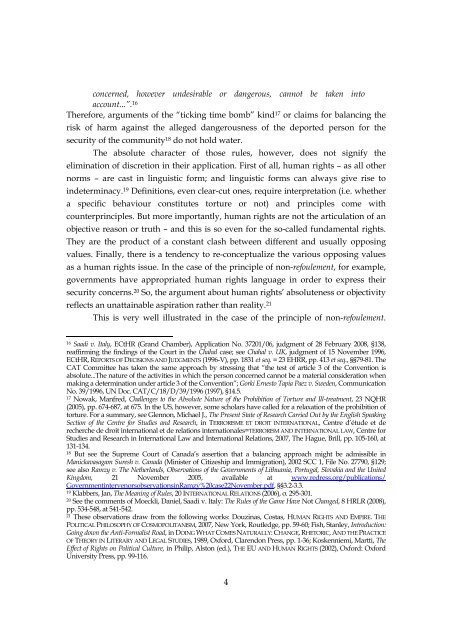
![Download [pdf] - The Graduate Institute, Geneva](https://img.yumpu.com/23370020/1/190x248/download-pdf-the-graduate-institute-geneva.jpg?quality=85)
